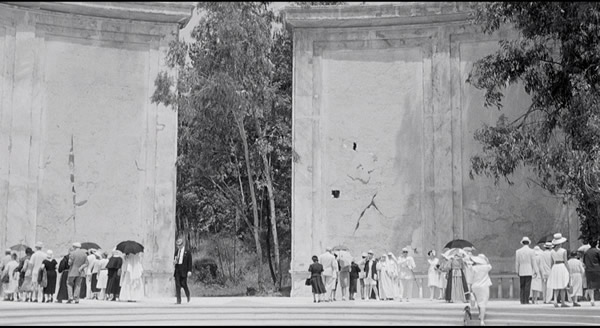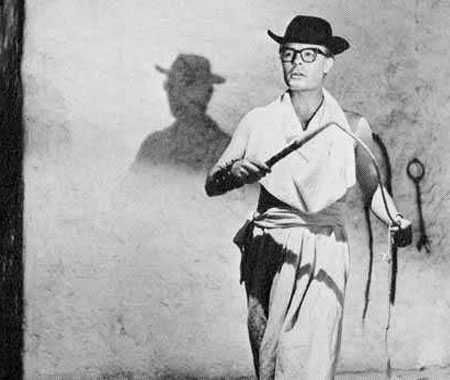Some spoilers ahead, but they don't ruin the enjoyment of the film:
The plot is confusing and switches time frame frequently. It is the story of Guido, a director in the midst of creating a film that no one making the film knows the story or anything about it. At the beginning is a dream in which Guido is in a car filled with smoke and he is choking, then he dreams that he flies out of the sunroof of the car and floats in the air, until his producer captures him with a rope at the beach, where he is pulled down, falling to the ocean.
The plot is confusing and switches time frame frequently. It is the story of Guido, a director in the midst of creating a film that no one making the film knows the story or anything about it. At the beginning is a dream in which Guido is in a car filled with smoke and he is choking, then he dreams that he flies out of the sunroof of the car and floats in the air, until his producer captures him with a rope at the beach, where he is pulled down, falling to the ocean.
As he is making this
film, he is in a spa and mineral springs for his deteriorating health. He had handed the script over to his harshest
critic, a cinematic artist, who condemned the script as trash through and
through. Guido knew that changes had to
be made to the script, but he wanted to stick with it, because within it is a
kernel of truth about himself that had to come out. His mistress follows him to the spa, where
she expects to take a holiday with him, but she gets sick and he ends up having
to take care of her. And all those
making the movie with him need constant direction or coddling or help from
him—but he feels that he is washed up, unable to direct anymore.
Eventually he invites his estranged wife to join him, which
she does with joy until she notices his mistress, of whom she knows. His wife becomes sullen and distant, until
she explains her anger to him. He has a
fantasy about him having a harem of all the women he is attracted to which is
very pleasant, until they rebel against him because of his rule to discard any
of his harem who is older than twenty nine.
In an examination of a number of screen tests, it is obvious
to those who know him that, rather than the science fiction film they thought
he was making, that he was planning a film about his life. Some of the script comes out, and his wife
understands that he is trying to defend his unfaithfulness and lies. She tells him at that point that she is
leaving him.
He decides to listen to his critic and to abandon the
project. The sets are taken down, and he
imagines himself attacked by critics and his producer, and he crawls under a
table and shoots himself. Then his
entertainment self convinces him to go through with the movie, presenting it as
a musical comedy, where everyone in is life is dancing together to make the
film. He begs his wife to join them, saying
that all he wanted to do is to present the truth, even her side of the
truth. She reluctantly joins the dance,
and the film is made.
There is so much else about this movie that should be
said. I only gave the barest bones, and
communicated none of the wonderful complexity, the richness of the fantasy, the
fullness of the life presented.
Interestingly enough, Guido, although a well-known director, is
relatively passive throughout the film, doing whatever people wished of him,
saying whatever they wanted to hear. I
didn’t get around to the important sub-plots of Claudia, Guido’s idealized
woman and actress or Seraphina, whom his Catholic teachers called “the devil”,
but Guido as a child was drawn to because of her seductive dance. There is so much here, that to summarize it
is to lose something significant.
My personal interpretation:
All throughout this film, I had two other movies running
through my head: All that Jazz, (the Bob Fosse auto-bio pic) and Adaptation
(the Charlie Kauffman auto-bio-pic). All
three movies talk about aging, the creative process and has interchange between
autobiography and fantasy. Clearly the
two later movies depended much on Fillini’s classic, and 8 ½ is the more
complex, more human and more likeable film.
Another movie I thought of is Altman’s The Player, because
of the self-referential nature of both films and their critique of filmmaking
and those who make movies. Also, both
films attempt to be comedies (The Player is more successful in that), but the
utter gravity with which they take filmmaking ultimately belies the humor they
present.
But never have I seen a movie so successful at being a
satire of itself. The movie Guido is
directing is a mystery throughout much of 8 ½, until the watcher understands
that Guido is making 8 ½ itself. But
what kind of a movie is it? There are
different characters presented to guide the direction of the movie. The critic, who dislikes it’s lack of art and
popular notions. The producer, who wants
something popular, with famous actors, that will sell tickets. The entertainer, who wants it to fascinate
and captivate the audience. But they are
all a part of Guido/Fellini, who’s indecision is actually playing out in his
own head. And then there is the personal
nature of the film—what will the film mean to his wife, his mistress, to others
whom he portrayed? All of this adds to
the indecision.
Ultimately, he decides on an entertainment that tells the
truth—about himself and about the creative process. No, the truth may not be pleasant for himself
or his loved ones, but it must be told.
But, in deciding on the entertainer, he has made the art film par-excellance—despite his critic telling him it is no such thing.
In the end, this is one of the greatest films I have ever seen. After just this one seeing, I am putting it
my top five. I don’t know when I have
ever seen a movie so complicated and yet almost perfectly balanced, so
fascinating and yet so entertaining, such an equal use of my heart and my
head.
-Written in 2010





No comments:
Post a Comment